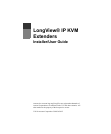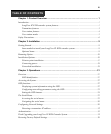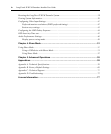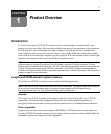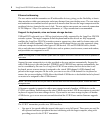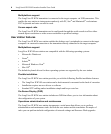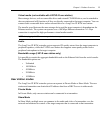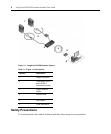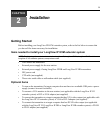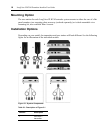
2 LongView® IP KVM Extenders Installer/User Guide
Ethernet addressing
The user station and the transmitter are IP-addressable devices, giving you the flexibility to locate
them anywhere within your enterprise and at any distance from your desktop users. The user station
and transmitter use standard network protocols to transfer data between the target computer and the
peripheral devices located at the user’s desk. The user station can operate on a network connection
of 100 Mbps or 1 Gbps. For optimum performance, a 1 Gbps connection is recommended.
Support for keyboards, mice and mass storage devices
USB and PS/2 keyboards (up to 109 keys) and mice are fully supported by the LongView IP KVM
extender system. The target computer default keyboard and mouse drivers are fully supported,
enabling the LongView IP KVM extender system to support two, three and five-button mice with
scroll and tilt-wheel capability. Composite mouse and keyboard devices are also supported, along
with mass storage devices and other types of USB devices. CD and DVD/ROM drives, thumb
drives and other non-isochronous USB devices such as printers, touch screens, smart card readers,
and pen tablets are supported as well.
NOTE: The LongView IP KVM extender system does not support isochronous USB devices such as speakers or
web cams.
Support for mass storage devices is also provided on the user stations automatically. Support for
other USB devices is provided on the LVIPHR-R and LVIPDH-R user stations automatically, but
can be overridden by the user. In a LongView IP KVM user station, the first device that is not
keyboard, mouse or mass storage is assigned to the virtual USB channel (vUSB channel) and
passed to the target computer. In the event you want to use the vUSB channel for a keyboard or
mouse, the on-screen display (OSD) allows the default vUSB device to be disabled and a keyboard
or mouse to be assigned to that vUSB channel.
NOTE: The vUSB channel will only be used for devices other than the standard keyboard, mouse and mass
storage devices.
A firmware upgrade is required to utilize mass storage instead of another vUSB device on the
LVIP-R user station. Default support for other USB devices in the LVIP-R user stations is provided
in place of support for a mass storage device. If you need to use mass storage in place of another
vUSB device, go to www.avocent.com and download the LVIP-R user station firmware upgrade.
NOTE: A hub cannot be used to expand the number of USB ports available.
The LVIP-T transmitter provides two USB interfaces:
• One port is low speed while the second video port is set to full speed. These ports are used for
all keyboard and mouse peripheral devices interfacing with the target computer, along with
providing power for the LVIP-T transmitter.





